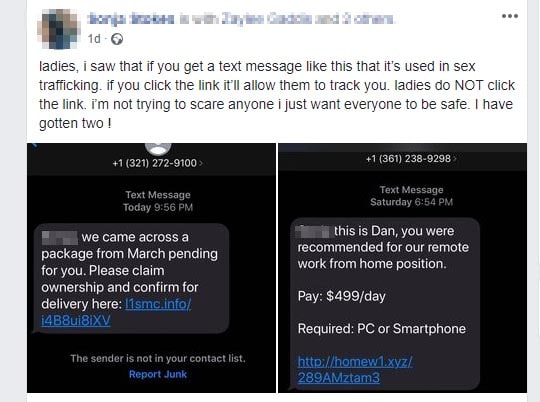Does clicking a link in a message let sex traffickers track you? Fact Check
A warning directed at women claims that if they click a specific type of link, then criminals involved in sex trafficking can track them.
 FALSE
FALSE
Examples of the claim as they appeared on social media are below.

ladies, i saw that if you get a text message like this that it’s used in sex trafficking. if you click the link it’ll allow them to track you. ladies do NOT click the link. i’m not trying to scare anyone i just want everyone to be safe. I have gotten two !
Of course, not clicking links in suspicious text or online messages is a good idea, especially if they are from an unknown sender, since such links could lead to a plethora of online scams. However, there is simply nothing to substantiate the claim that such messages are linked to sex trafficking. We are also not aware of any current threat that could allow a criminal to track the exact location of someone if that person clicks a link in a message.
The advice to not click links in such messages is certainly sound. A whole host of scams use unsolicited messages with misleading claims to lure recipients into clicking links. Such a technique is popular with work-from-home scams, malware attacks (though in most instances simply clicking a link isn’t sufficient by itself for malware to install) or, most prolifically, phishing attacks.
Sponsored Content. Continued below...
To confirm this point, we visited many of the links presented in screenshots attached to these circulating “sex trafficking” messages, to see what types of potential scams awaited, and to see if there was any feasible way they could be linked to sex trafficking.
The link claiming to have a package pending for the recipient led to a SMS subscription scam, where victims are tricked into handing over their personal information, including their phone number, which ultimately results in the victim unwittingly enrolling into expensive SMS subscription schemes.
The link claiming to pay $499 a day led to a work-from-home scheme that claims to offer an automated way of making hundreds of dollars a day, just as soon as you cough up $50 to enrol. Such schemes typically sell largely useless information about Internet marketing, while making unrealistic claims and using fake testimonials.
None of these scams are particularly new, and we’ve been warning about them for a number of years. While they can certainly scam people out of money, none of them are linked to sex trafficking.
Sponsored Content. Continued below...
Of course, sex trafficking is a genuine issue, and women can find themselves victims of the sex trafficking trade in a variety of ways. But a thorough search of the Internet reveals no cases where victims were found simply by clicking a link in an online message.
Additionally, while there are a number of technologies that can give someone a person’s rough location if they click a link (typically based on their ISP) we are not aware of anything that could allow someone to track a person’s exact location in the manner described.
While we recommend people don’t click on these types of links, there is no evidence that they are associated with sex trafficking, and visiting the links themselves confirms this. We rank this claim false.
Continued below...
Thanks for reading, we hope this article helped, but before you leave us for greener pastures, please help us out.
We're hoping to be totally ad-free by 2025 - after all, no one likes online adverts, and all they do is get in the way and slow everything down. But of course we still have fees and costs to pay, so please, please consider becoming a Facebook supporter! It costs only 0.99p (~$1.30) a month (you can stop at any time) and ensures we can still keep posting Cybersecurity themed content to help keep our communities safe and scam-free. You can subscribe here
Remember, we're active on social media - so follow us on Facebook, Bluesky, Instagram and X
